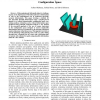Free Online Productivity Tools
i2Speak
i2Symbol
i2OCR
iTex2Img
iWeb2Print
iWeb2Shot
i2Type
iPdf2Split
iPdf2Merge
i2Bopomofo
i2Arabic
i2Style
i2Image
i2PDF
iLatex2Rtf
Sci2ools
ICRA
2010
IEEE
2010
IEEE
Deformable robot motion planning in a reduced-dimension configuration space
Abstract-- Motion planning of deformable objects is challenging due to the high degrees-of-freedom inherent in deformation as well as the computational cost of producing physically accurate deformations. This paper develops a method for fast, physically plausible deformations using a sampling-based planner in a reduced dimensionality configuration space containing position, orientation, and a reduced deformation space produced using principal component analysis. A key element of the presented approach is the use of energy constraints in the configuration space designed to remove implausible deformations that may be produced by the principal component analysis dimension reduction process. This approach is tested on several deforming robot planning tasks, such as a sphere fitting through slots, a bendable bar in a maze, and a deforming plate in tunnels, with collision free paths using plausible deformations found in a few minutes.
Configuration Space | ICRA 2010 | Plausible Deformations | Principal Component Analysis | Robotics |
| Added | 13 Feb 2011 |
| Updated | 13 Feb 2011 |
| Type | Journal |
| Year | 2010 |
| Where | ICRA |
| Authors | Arthur Mahoney, Joshua Bross, David Johnson |
Comments (0)

